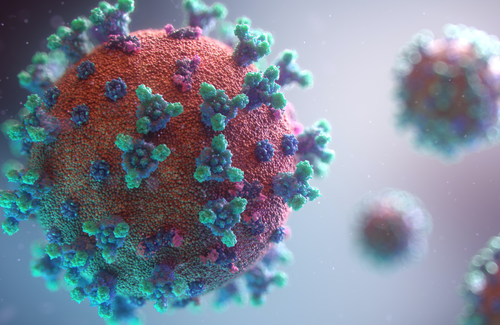
People with HIV who were diagnosed with COVID-19 had a 35% higher risk of a major cardiovascular event in the following year compared to other people with HIV, a Spanish study presented on Thursday at the 19th European AIDS Conference (EACS 2023) in Warsaw reported.
The difference in risk was concentrated in three types of cardiovascular problem: thrombosis (disorders caused by blood clots), heart failure (failure of the heart to pump sufficient blood) and other heart disorders including aneurysms (where a blood vessel balloons and may suddenly rupture). People with HIV with a diagnosis of COVID-19 did not have higher rates of heart attack or stroke.
Several large studies in the general population have reported that people diagnosed with COVID-19 are at higher risk of experiencing a major cardiovascular event such as heart attack compared to the rest of the population.
A large study of people receiving care through US Veterans hospitals found that a COVID-19 diagnosis raised the risk of numerous cardiovascular outcomes during the following year, from stroke and heart attack to deep vein thrombosis, angina and disturbances in heart rhythm such as atrial fibrillation. The study found that the risk was raised regardless of whether people were hospitalised with COVID-19 or not, and regardless of whether they had a prior history of cardiovascular disease.
Other studies in the United Kingdom, Sweden and Denmark have also reported an increased risk of major cardiovascular events in people who had been diagnosed with COVID-19.
Although studies have shown that unvaccinated people with HIV have a somewhat higher risk of being admitted to hospital and dying of COVID-19, the risk of new cardiovascular events after a COVID-19 diagnosis has not been studied in people with HIV.
The question is especially important for people with HIV, as numerous studies have shown that people with HIV have raised cardiovascular risks due to HIV itself, dyslipidaemia caused by antiretroviral treatment and lifestyle factors such as smoking and weight. Does COVID-19 exacerbate the existing risks for people with HIV?
To investigate the risk of cardiovascular events in people with HIV after a COVID-19 diagnosis, Dr Raquel Martin Iguacel and colleagues looked for COVID-19 diagnoses in the PISCIS HIV cohort database between March 2020 and July 2022 and for cardiovascular events in the PADRIS database, which compiles data on health service utilisation in the Spanish region of Catalonia.
Cardiovascular events eligible for inclusion in the analysis consisted of dysrhythmia (disturbances in heart rhythm); cerebrovascular disease (stroke or brain haemorrhage); ischaemic heart disease (any disease caused by narrowing of the arteries supplying the heart, including heart attack and angina); thrombotic disorders such as deep vein thrombosis or blood clots; heart failure; inflammatory heart disease; peripheral vascular disease; aneurysms (ballooning or ruptured artery) or other disorders such as cardiac arrest.
The analysis identified 4199 people with HIV with COVID-19 and 14,004 without COVID-19. The study population was predominantly male (82%) with a median age of 45 in the COVID group and 48 in the non-COVID group. Approximately 3% had CD4 counts below 200 (a risk factor for severe COVID-19 outcomes) and the median CD4 count was 688 in the COVID-19 group. Ninety per cent had an undetectable viral load.
Forty per cent of those with COVID-19 and 36% of those without COVID-19 had at least one co-morbidity associated with increased COVID-19 risk, most commonly chronic liver disease (11%), a cancer of the blood (13%) or dyslipidaemia (10%) and there was no substantial difference between study arms in the prevalence of any co-morbidity except high blood pressure, which was more common in people who did not contract COVID-19 (11% vs 6%).
Cardiovascular disease had been previously diagnosed in 11.8% prior to COVID-19 diagnosis, compared to 10.5% of the non-COVID group.
Among those diagnosed with COVID-19, 7% were admitted to hospital and 25 people out of 4199 required intensive care after hospitalisation. Thirteen per cent of those diagnosed with COVID-19 experienced at least two infections with COVID-19.
During a median follow-up period of 243 days, 211 people with a COVID-19 diagnosis and 621 without COVID-19 had a cardiovascular event, an incidence rate of 70.2 and 56.8 per 1000 person-years, respectively.
In a multivariable analysis that adjusted for demographic factors, HIV-related factors, COVID-19 and co-morbidities associated with COVID-19, a diagnosis of COVID was associated with 35% increased risk of any cardiovascular event (adjusted hazard ratio 1.35, 95% CI 1.13-1.60).
The elevated risk was present in all subgroups and was especially pronounced in those people with HIV diagnosed with COVID-19 who had chronic lung disease or chronic kidney disease.
The risk of cardiovascular events was also elevated in heterosexual men (aHR 1.28, 95% CI 1.01-1.62) and in people with a previous history of cardiovascular disease (aHR 27.44, 95% CI 21.83-34-49), chronic kidney disease (aHR 1.66, 95% CI 1.17-2.37) and chronic liver disease (aHR 1.34, 95% CI 1.04-1.73).
The elevated risk was still evident when people with previous cardiovascular disease were excluded from the analysis (aHR 1.60, 95% CI 1.13-2.28).
The most frequent cardiovascular events were ischaemic heart disease (affecting 1.6% of all people diagnosed with COVID-19), heart failure (1%) and stroke (0.9%). But the only events which occurred more frequently in people with COVID-19 were thrombotic disorders (p=0.007), heart failure (p=0.009) and other cardiac disorders including aneurysms (p=0.001). There was no significant difference in rates of dysrhythmia, cerebrovascular disease, inflammatory heart disease, peripheral vascular disease, or ischaemic heart disease.
The study investigators conclude that among people with HIV diagnosed with COVID-19, even if COVID-19 didn’t lead to hospitalisation, cardiovascular health needs to be a focus of care in people recovering from COVID-19. Ensuring that people with HIV are vaccinated against COVID-19 and keep up to date with booster doses is important for a population that already has an increased risk of heart disease.
Martin Iguacel R et al. Risk of major cardiovascular events after COVID-19 in people with HIV: the prospective PISCIS cohort study. 19th European AIDS Conference, Warsaw, abstract PS3.01, 2023.

